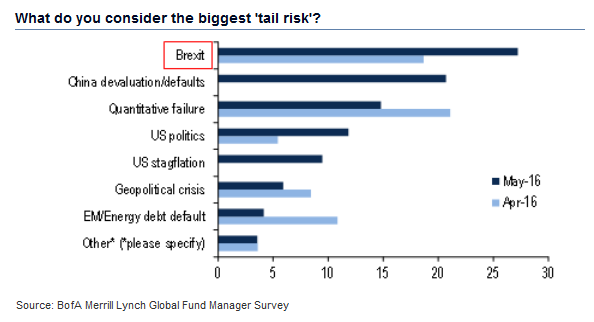Managers Brace for ‘Summer of Shocks’
Asset managers are raising cash levels in their portfolios and employing defensive trades ahead of a predicted “summer of shocks,” according to a survey by Bank of America Merrill Lynch (BoAML).
“Investors continue to hold elevated cash levels to protect against potential shocks from Brexit, China, and quantitative failure.”The global survey, carried out earlier this month, reported that investors had made major reductions to their UK exposures ahead of a public vote on the country’s membership of the European Union on June 23.
The average allocation to the UK has hit a low point not seen since 2008, BoAML said, as ‘Brexit’ was cited as the biggest tail risk by the 168 respondents. This is despite 71% of respondents saying they thought “unlikely” or “not at all likely” that the UK would vote to leave the EU.
“Although global growth expectations rose slightly from the previous month, investors continue to hold elevated cash levels to protect against potential shocks from Brexit, China, and quantitative failure,” said Michael Hartnett, chief investment strategist at BoAML.
 The average cash
balance from the managers surveyed reached 5.5%, BoAML reported. Similar
stockpiles were last reported in 2012 at the height of the Greek debt crisis.
The average cash
balance from the managers surveyed reached 5.5%, BoAML reported. Similar
stockpiles were last reported in 2012 at the height of the Greek debt crisis.
Managers also cited fears of devaluations or defaults in China as a serious tail risk to their portfolios, following a slump in Chinese economic output in 2015 and into the first quarter of 2016. Respondents predicted two interest rate hikes from the US Federal Reserve this year, and no move towards a “helicopter money” stimulus package—both seen as negative developments for equities.
These concerns drove investors into “defensive” sectors, the survey reported, including utilities and real estate companies. The majority of managers expected high-quality, high-dividend, and low-volatility stocks and strategies to outperform over the next 12 months. However, this area of the market was also cited as being the most crowded trade.
BoAML’s “risk and liquidity” index—a measure of how many respondents were taking more risk than usual—fell since April. A reading of 34, down from 36, was one of the lowest points since 2012.
Related: ‘Brexit’ Fears Mount for Asset Managers & Managers Stockpile Cash as Tail Risk Fears Grow
